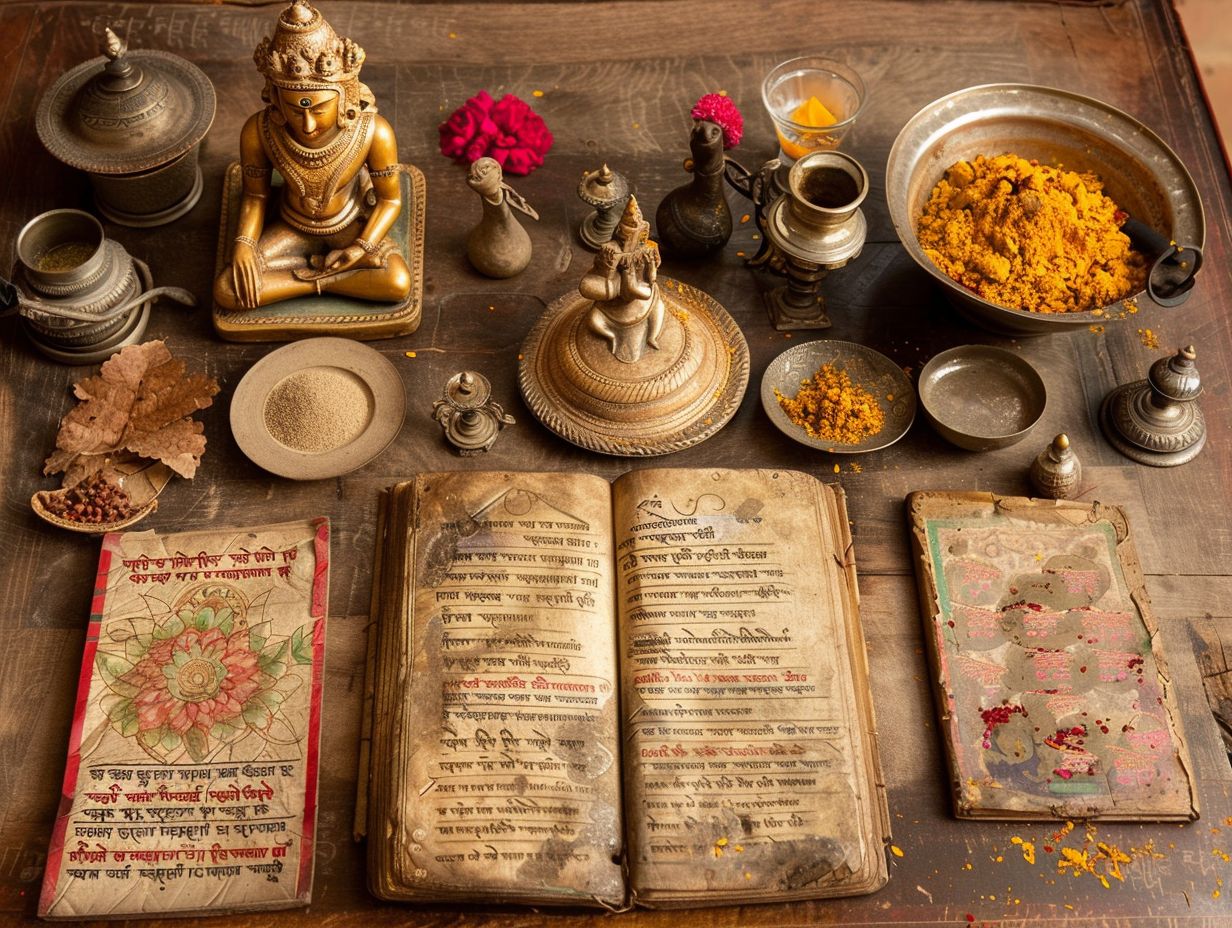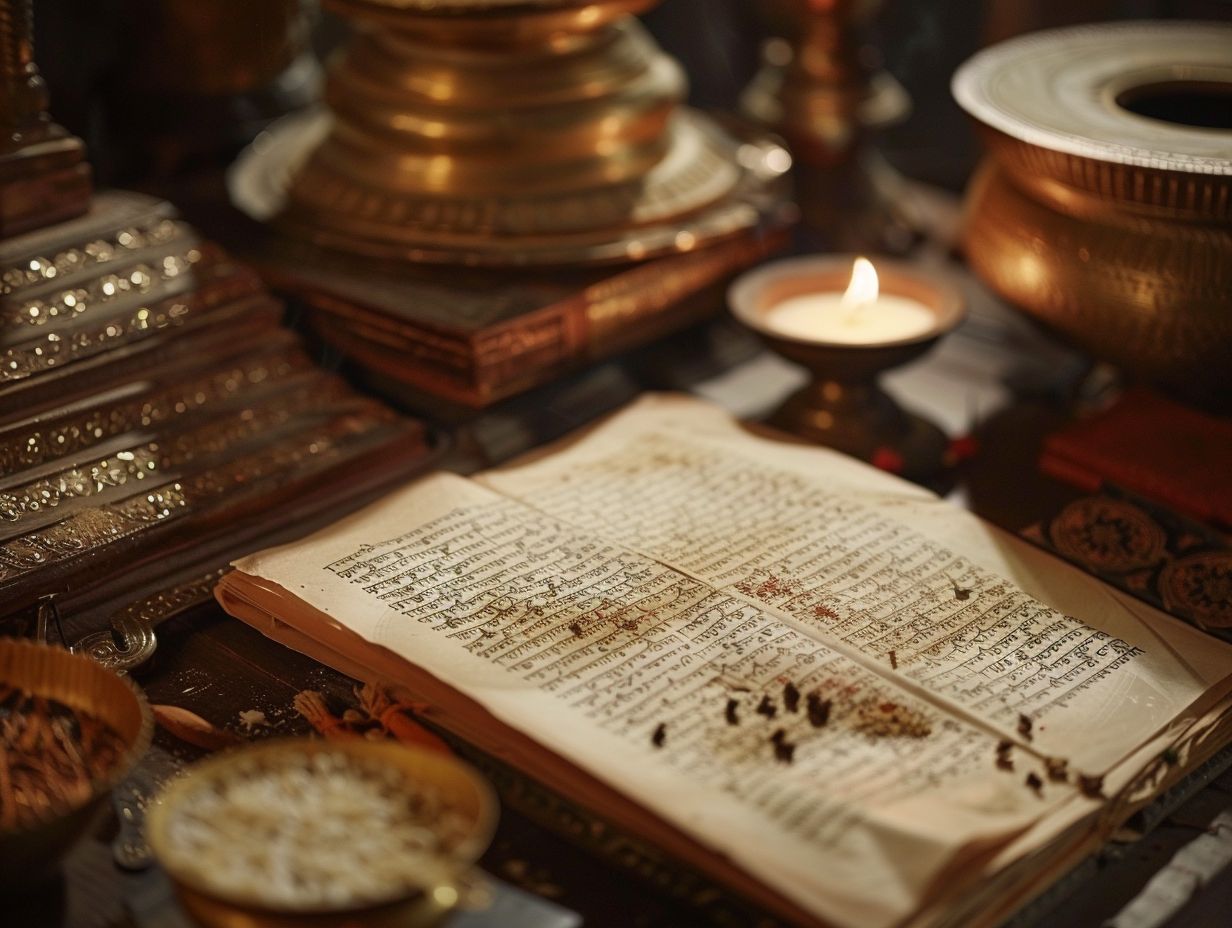Principles and Practices of Mimamsa
Mimamsa, regarded as one of the oldest systems of Indian philosophy, provides profound insights into the interpretation of the Vedas and the significance of rituals within Hindu tradition. Anchored in principles such as the authority of the Vedas and the concept of karma, this philosophical framework underscores the vital role of dharma in everyday life. For an introduction to Mimamsa philosophy, it highlights the importance of understanding these foundational concepts.
This exploration delves into the foundational principles, practices, and various schools of Mimamsa, while also examining its relationship with other philosophical systems and the critiques it encounters.
One can discover the rich tapestry of thought that shapes this essential aspect of Indian philosophy.
What is Mimamsa?

Mimamsa stands as a foundational school of Hindu philosophy, dedicated to the interpretation and understanding of the Vedas. This tradition emphasizes the principles and practices that govern rituals, dharma, and ethical living.
Deeply rooted in ancient Indian thought, Mimamsa engages in rigorous epistemological inquiry and hermeneutics to explore the validity of scriptural texts. Its objective is to elucidate the significance of rituals and performance as essential components of human action and societal roles.
Moreover, it upholds the authority of the Vedas while actively engaging in scholarly debate surrounding their interpretation and implications.
What are the Principles of Mimamsa?
The principles of Mimamsa are deeply anchored in the authority of the Vedas, regarded as the ultimate source of knowledge and ethical guidance within this philosophical tradition.
At the heart of these principles lies a profound belief in dharma, which encompasses the moral obligations and duties that dictate human action, alongside the concept of karma, which highlights the repercussions of one’s deeds.
Through meticulous textual analysis and hermeneutics, the scholars of Mimamsa endeavor to interpret the Vedic texts in both prescriptive and descriptive manners. In doing so, they establish a comprehensive framework that elucidates rituals, ethical considerations, and the philosophical underpinnings of human conduct.
1. Authority of the Vedas
The authority of the Vedas in Mimamsa is undeniably paramount, with these ancient texts regarded as the ultimate source of knowledge and truth that guide ethical and ritualistic practices within Hindu philosophy. This foundational role reflects a profound belief that the Vedas not only articulate sacred truths but also provide a framework for interpreting both the universe and human existence.
The Mimamsa school places significant emphasis on the importance of tradition in validating these texts, highlighting that the continuity of their teachings across generations enhances their legitimacy. This collective memory, meticulously preserved over centuries, fortifies the epistemic justification of the Vedas, enabling practitioners to engage with the texts in a manner that is both meaningful and enriching.
Such engagement profoundly influences various religious practices, shaping rituals and ethical decisions that mold spiritual life, ultimately securing the Vedas’ esteemed position at the heart of Hindu customs and beliefs.
2. Importance of Rituals
In the Mimamsa tradition, rituals occupy a pivotal role, regarded as the means through which individuals fulfill their dharma, engage in sacrifices, and ensure the efficacy of their actions in alignment with the philosophical tenets established in the Vedas.
These practices transcend mere performance; they are essential acts that reinforce the connection between human behavior and divine intent. Through a structured approach to rituals, individuals adeptly navigate their societal roles, embracing the responsibilities bestowed upon them while nurturing communal harmony.
The act of performing rituals serves as a reflection of one’s commitment to upholding values that resonate with the universal order. Philosophical explorations surrounding the efficacy of various rituals illuminate their capacity to transform the intentions behind human actions into tangible outcomes, effectively bridging the gap between the mundane and the celestial.
This intrinsic relationship underscores the profound significance of both individual and collective rituals in shaping the ethical and spiritual frameworks within a society.
3. Concept of Karma
The concept of karma in Mimamsa is deeply intertwined with ethical considerations and the obligations (dharma) that individuals are expected to uphold. It suggests that every action carries consequences that not only shape one’s future experiences but also contribute to spiritual evolution.
This dynamic relationship highlights the significance of intention and awareness in human actions, as individuals navigate the intricate landscape of moral choices. By diving into the philosophical arguments surrounding karma, one can discern how these ancient perspectives resonate with contemporary ethical discussions. In today s society, where actions are frequently interpreted through an individualistic lens, the Mimamsa viewpoint serves as a poignant reminder of the broader interconnectedness of actions.
It encourages individuals to contemplate their responsibilities toward others and to recognize how their decisions create ripples through the fabric of community life, ultimately impacting both personal destinies and collective well-being.
4. Emphasis on Dharma
Emphasizing dharma, Mimamsa advocates for the unwavering commitment to moral obligations and societal roles, providing individuals with a guiding framework to achieve harmony and fulfillment within both personal and communal realms.
This philosophical paradigm underscores the significance of aligning one’s duties with the ethical responsibilities intrinsic to their societal position. By engaging with the tenets of karma, practitioners are encouraged to appreciate the profound impact of their actions on collective well-being, highlighting that each decision resonates throughout the intricate fabric of social structure.
Rituals, in this context, transcend mere behavioral prescriptions; they emerge as vital expressions of dharma that strengthen community cohesion. Therefore, grasping these interconnected concepts equips individuals to navigate life’s complexities while nurturing a sense of accountability and respect for the shared human experience.
What are the Practices of Mimamsa?

The practices of Mimamsa encompass a diverse array of activities thoughtfully designed to enhance both understanding and application of its philosophical principles. These activities include:
- the study of the Vedas
- the performance of rituals
- engaging in rigorous debates
- the pursuit of meditation
Each of these elements is aimed at achieving a profound comprehension of dharma and fostering ethical living.
1. Vedic Study and Interpretation
The study and interpretation of the Vedas constitute the foundation of Mimamsa practices, where scholars engage in rigorous textual analysis and craft commentaries to illuminate the intricate meanings embedded within the canonical texts. This multifaceted approach demands a meticulous examination of linguistic nuances, grammatical structures, and contextual revelations present in these sacred writings.
By employing diverse methodologies rooted in the profound intellectual traditions of ancient India, practitioners aim for an understanding that faithfully honors the original intent of the texts. The role of commentaries is paramount, as they not only provide insights into historical and philosophical contexts but also foster a dialogue between past and present interpretations.
Such scholarly endeavors underscore the significance of both precision and reverence in Vedic scholarship, which is essential for preserving the sanctity and depth of these venerated doctrines.
2. Performance of Vedic Rituals
The performance of Vedic rituals stands as a cornerstone of Mimamsa, highlighting the profound significance of ritualistic actions in fulfilling dharma and their cultural role in nurturing community and spiritual ties.
These rituals span a rich tapestry of ceremonies, ranging from daily offerings and seasonal festivals to pivotal life events such as weddings and funerals. Each type of ritual not only serves to honor the deities but also facilitates practitioners in aligning themselves with cosmic principles. The meticulous adherence to the prescribed rituals is thought to enhance their effectiveness, enabling individuals to cultivate a more profound connection with the divine.
This connection fosters a robust sense of collective identity, as communities unite, reinforcing social bonds and shared values deeply rooted in ancient traditions. Ultimately, these practices ensure that the spiritual and cultural fabric of society remains vibrant, embodying the timeless quest for harmony between the earthly and the divine.
3. Debate and Discussion
Debate and discussion constitute the very essence of the Mimamsa tradition, providing a dynamic arena for scholars to immerse themselves in philosophical inquiry and engage in a critical examination of the principles and practices deeply rooted in Vedic teachings.
This ongoing dialogue not only enriches individual comprehension but also catalyzes the evolution of intricate ideas within the tradition. Scholars routinely confront significant themes, such as the nature of ritual efficacy, the interpretation of sacred texts, and the relevance of dharma in contemporary contexts.
Through rigorous debate, a spectrum of divergent viewpoints arises, enabling scholars to scrutinize entrenched beliefs, reconstruct arguments, and cultivate innovative interpretations. As a result, this process nurtures intellectual rigor, ensuring that Mimamsa remains a vibrant and adaptable philosophical framework, consistently evolving to meet the challenges posed by modern thought and societal transformations.
4. Meditation and Contemplation
Meditation and contemplation stand as essential practices within Mimamsa, nurturing a profound understanding and personal engagement with its philosophical teachings while serving as a pathway for spiritual advancement.
These practices enable individuals to connect with the core principles of Dharma and the subtleties of Vedic texts, fostering a reflective approach to ethical dilemmas and significant life choices. Techniques such as focused breathing, mantra repetition, and reflective journaling facilitate the cultivation of mindfulness and clarity, thereby enhancing one s ability to discern the complexities of ritual actions and their relevance in everyday life.
Through the consistent practice of meditation, individuals can unlock a multitude of benefits, including increased emotional resilience, heightened awareness, and a deeper understanding of the interconnectedness of all existence. This experience aligns seamlessly with Mimamsa s emphasis on action and intention in the pursuit of truth.
What are the Main Schools of Mimamsa?
The primary schools of Mimamsa are Purva Mimamsa and Uttara Mimamsa, each embodying unique interpretations and philosophical traditions that extend the foundational teachings of the Vedas.
1. Purva Mimamsa

Purva Mimamsa, the earlier branch of the Mimamsa school, primarily concentrates on the rituals and ethical dimensions embedded within Vedic texts. It underscores the significance of proper performance and interpretation as essential to the realization of dharma.
This philosophical framework is meticulously constructed upon a thorough analysis of the Brahmanas and the rituals they prescriptively outline. Adherents of Purva Mimamsa maintain that sacred rites, when executed with intention and precision, yield both immediate and enduring benefits, thereby reinforcing both social and cosmic order.
The practice emphasizes the critical importance of adhering to one s dharma, which encompasses moral duties and societal responsibilities. Purva Mimamsa s unwavering commitment to ritualistic accuracy carries profound implications for ethical inquiries, establishing it as a cornerstone within the broader Mimamsa tradition and influencing various strands of philosophical thought throughout Indian philosophy.
2. Uttara Mimamsa
Uttara Mimamsa, commonly known as Vedanta, signifies a transformative progression within the philosophical landscape of Mimamsa, shifting the emphasis from ritualistic practices toward a profound inquiry into the nature of ultimate reality, knowledge, and liberation.
This transition represents a notable deviation from the earlier focus on Vedic rituals, paving the way for a deeper exploration of both the self and the cosmos. Within this framework, Uttara Mimamsa intricately investigates metaphysics, probing into the fundamental essence of Brahman, the ultimate reality that forms the foundation of all existence.
The philosophical questions raised within this system compel practitioners to examine the nature of consciousness, the intricate relationship between the individual soul (Atman) and the cosmic soul (Brahman), and the various pathways leading to liberation (Moksha).
By critically analyzing perception and the methodologies for acquiring knowledge, Uttara Mimamsa articulates a sophisticated understanding of reality that encourages individuals to transcend the ephemeral aspects of the world in their pursuit of eternal truth.
How is Mimamsa Related to Other Philosophies?
Mimamsa engages in pivotal relationships with various philosophical schools, particularly Vedanta, and plays a significant role in shaping the broader comprehension of Hinduism and Indian culture.
Its interpretations of ethics, rituals, and philosophical thought profoundly influence the landscape of these traditions, offering depth and insight into their foundational principles.
1. Relationship with Vedanta
The relationship between Mimamsa and Vedanta is marked by a rich philosophical dialogue, wherein both schools engage in the interpretation of Vedic texts while diverging in their approaches to knowledge, reality, and the ultimate purpose of human existence.
Mimamsa places a strong emphasis on the ritualistic dimensions of the Vedas, concentrating on dharma and the performance of rites as pathways to achieve worldly benefits and maintain social order. In contrast, Vedanta directs its attention toward the metaphysical and spiritual interpretations of these scriptures. This school prioritizes the understanding of Brahman, the ultimate reality, alongside the concept of Atman, the individual soul, diving into the principles of liberation and exploring the relationship between the self and the divine.
These differing emphases underscore the distinct contributions of each school to the broader landscape of Hindu thought, shaping a myriad of philosophical inquiries and practices throughout the centuries.
2. Influence on Hinduism and Indian Culture
Mimamsa exerts a profound influence on Hinduism and Indian culture, shaping ethical practices, ritualistic traditions, and philosophical inquiries that resonate through centuries of thought and scholarship. This ancient school of thought underscores the significance of dharma and the performance of rituals, guiding individuals in their daily lives while contributing to the formation of a cohesive community identity.
By emphasizing the importance of intention and correct action, Mimamsa instills a sense of moral responsibility among practitioners, encouraging adherence to societal norms and customs. Its teachings have not only enriched the spiritual dimensions of life but have also fostered a deeper understanding of the interconnection between rituals and ethical conduct. Consequently, the enduring legacy of Mimamsa is evident in the nuanced practices and beliefs that continue to define Hindu life today.
What are the Criticisms and Controversies surrounding Mimamsa?
The criticisms and controversies surrounding Mimamsa frequently stem from its steadfast commitment to Vedic authority and ritualistic practices. This dedication ignites debates among various philosophical schools, raising questions about the relevance and interpretation of these elements within contemporary contexts.
1. Criticisms from Other Schools of Philosophy

Critics from various philosophical schools often underscore the perceived rigidity of Mimamsa in its interpretation of the Vedas, questioning the relevance of ritualistic practices in the quest for philosophical understanding and liberation.
Proponents of Advaita Vedanta, in particular, assert that Mimamsa’s unwavering commitment to rituals undermines the profound metaphysical insights that a deeper exploration of the Upanishads can reveal. They argue that the focus on external rites and obligations diverts attention from the more significant inner realization of the self and the universal Brahman.
Furthermore, critics from the Buddhist tradition challenge Mimamsa’s emphasis on textual authority, suggesting that it cultivates a sense of dogmatism that hinders genuine spiritual advancement. This perspective maintains that true liberation cannot be attained through the mere performance of rituals; rather, it must arise from direct experiential understanding and mindfulness.
2. Controversies over Rituals and Sacrifices
Controversies surrounding rituals and sacrifices within Mimamsa frequently revolve around their ethical implications and relevance in a modern context, leading to profound inquiries regarding their necessity and societal impact.
These discussions explore the alignment of ancient customs with contemporary values, encouraging critical reflections on whether such rituals hold meaningful significance today or merely perpetuate outdated norms. Advocates of these practices assert that they promote community cohesion and cultural continuity, while detractors argue that they may inadvertently reinforce harmful ideologies or social hierarchies.
The philosophical importance of these rites is considerable, as they often encapsulate broader ethical principles and collective beliefs. Ultimately, the discourse compels individuals to scrutinize the intersection of tradition and modernity, contemplating how rituals might evolve to maintain relevance within an ever-changing moral landscape.
Frequently Asked Questions
What is Mimamsa and what are its principles?
Mimamsa is a Hindu school of philosophy that focuses on rituals, their significance, and the proper way to perform them. Its principles include emphasis on action, ritualistic worship, and the importance of the Vedas.
What is the goal of Mimamsa?
The goal of Mimamsa is to gain a better understanding of the Vedic texts and to perform rituals in accordance with their instructions. This is believed to lead to fulfillment and happiness in this life and the afterlife.
What are the main practices of Mimamsa?
The main practices of Mimamsa include study of the Vedas, performing rituals, and following the rules and guidelines outlined in the texts. These practices are meant to purify the mind and lead to spiritual growth.
What is the role of karma in Mimamsa?
In Mimamsa, karma is seen as the driving force behind all actions and their consequences. It is believed that performing rituals with the proper intention and following the prescribed rules leads to good karma and ultimately, liberation.
How does Mimamsa view the concept of God?
Mimamsa does not subscribe to the belief in a single, omnipotent God. Instead, it focuses on the power of rituals and the role of karma in shaping one’s life. However, the Vedic texts do mention various deities and their importance in ritualistic practices.
Is Mimamsa still practiced today?
Yes, Mimamsa is still practiced today, particularly in South India. It continues to be an important philosophical school in Hinduism, influencing the way rituals are performed and understood. Its principles and practices are also studied and analyzed by scholars and philosophers.
